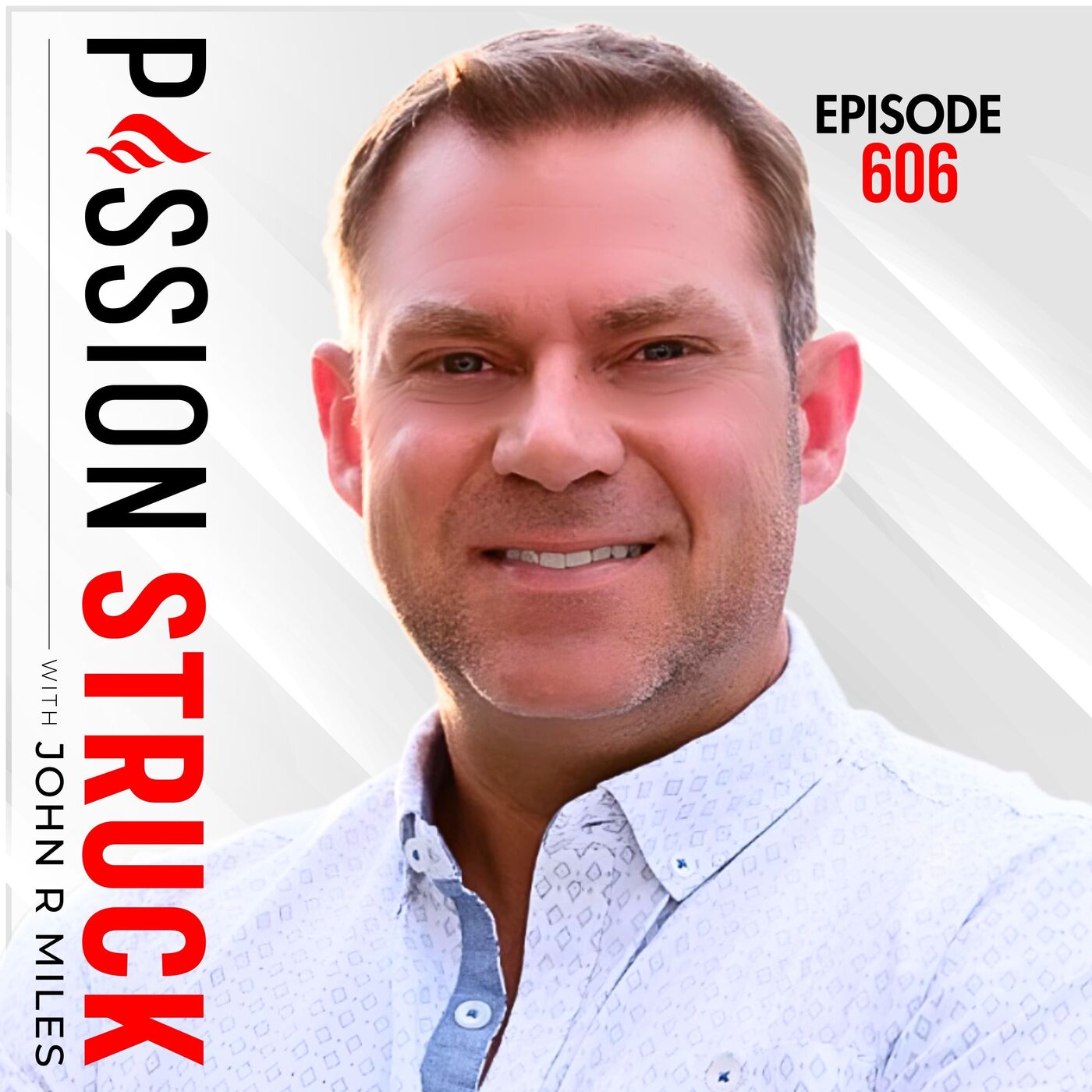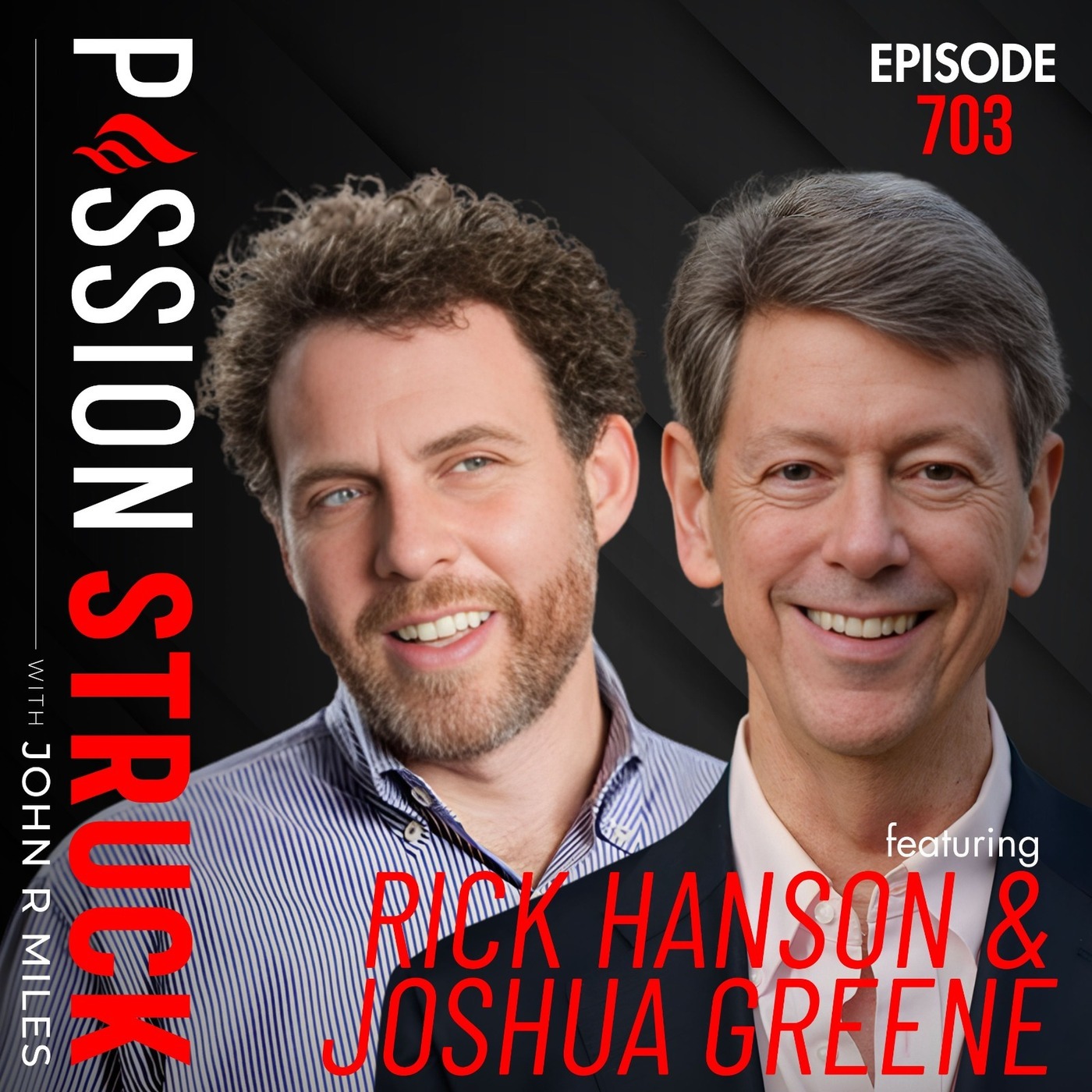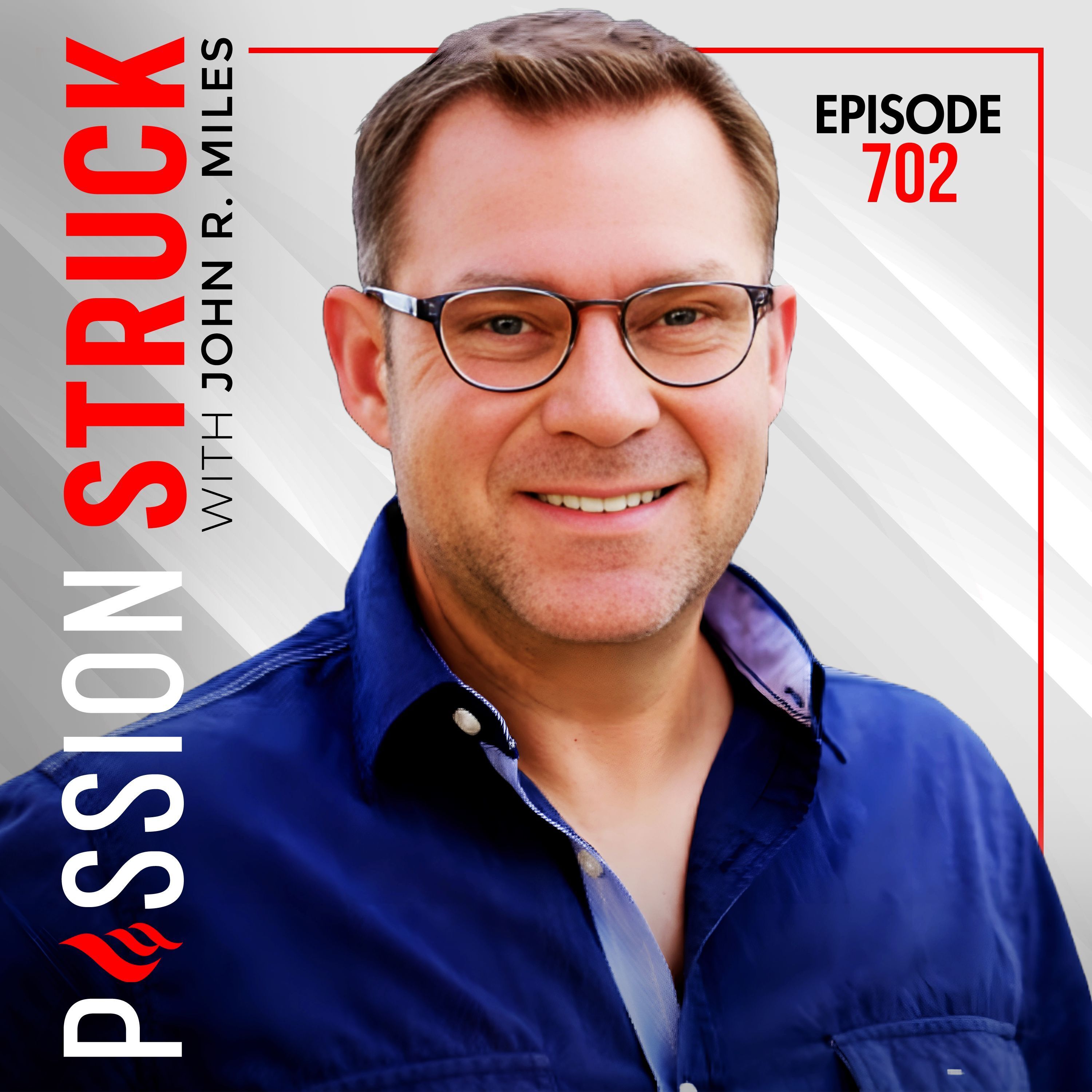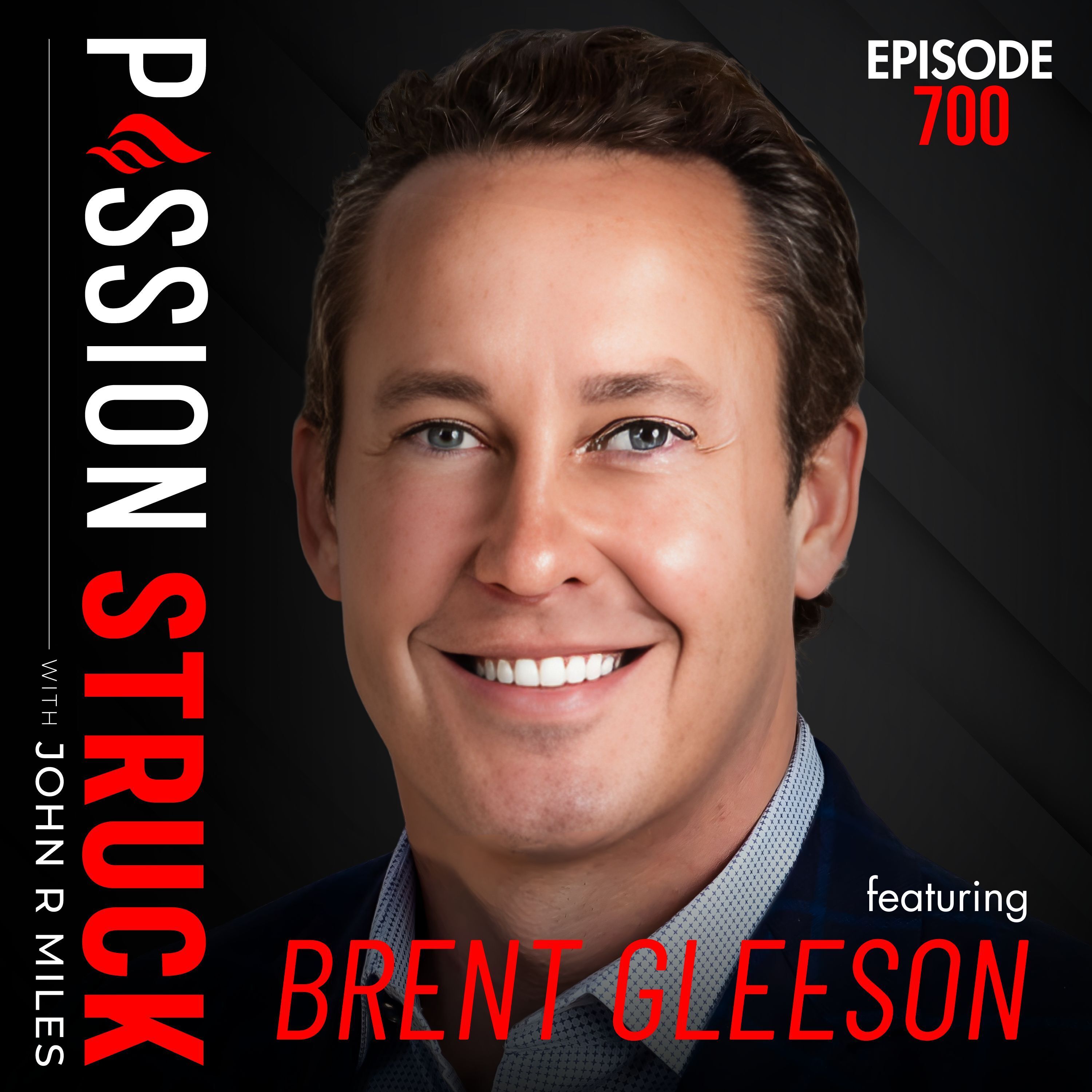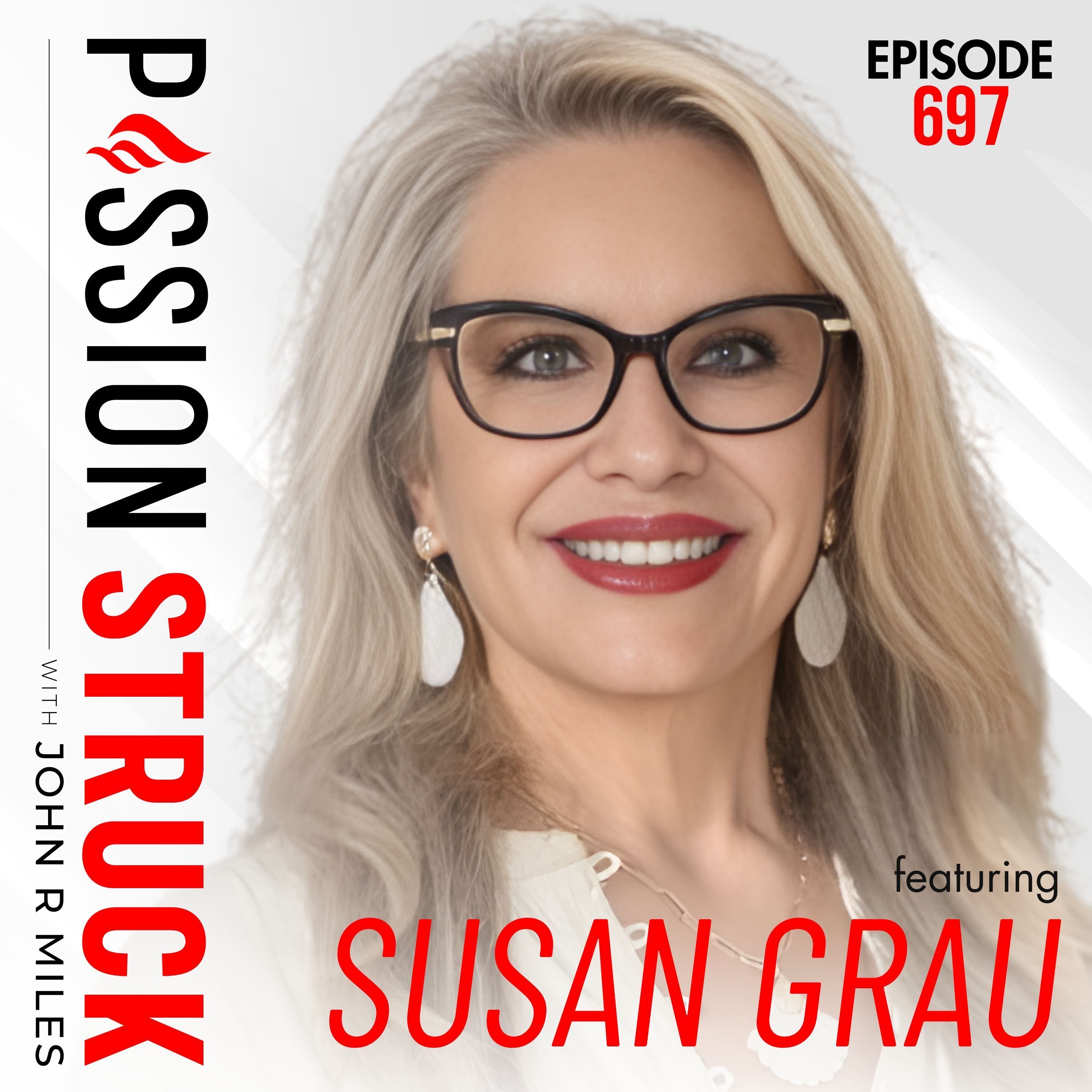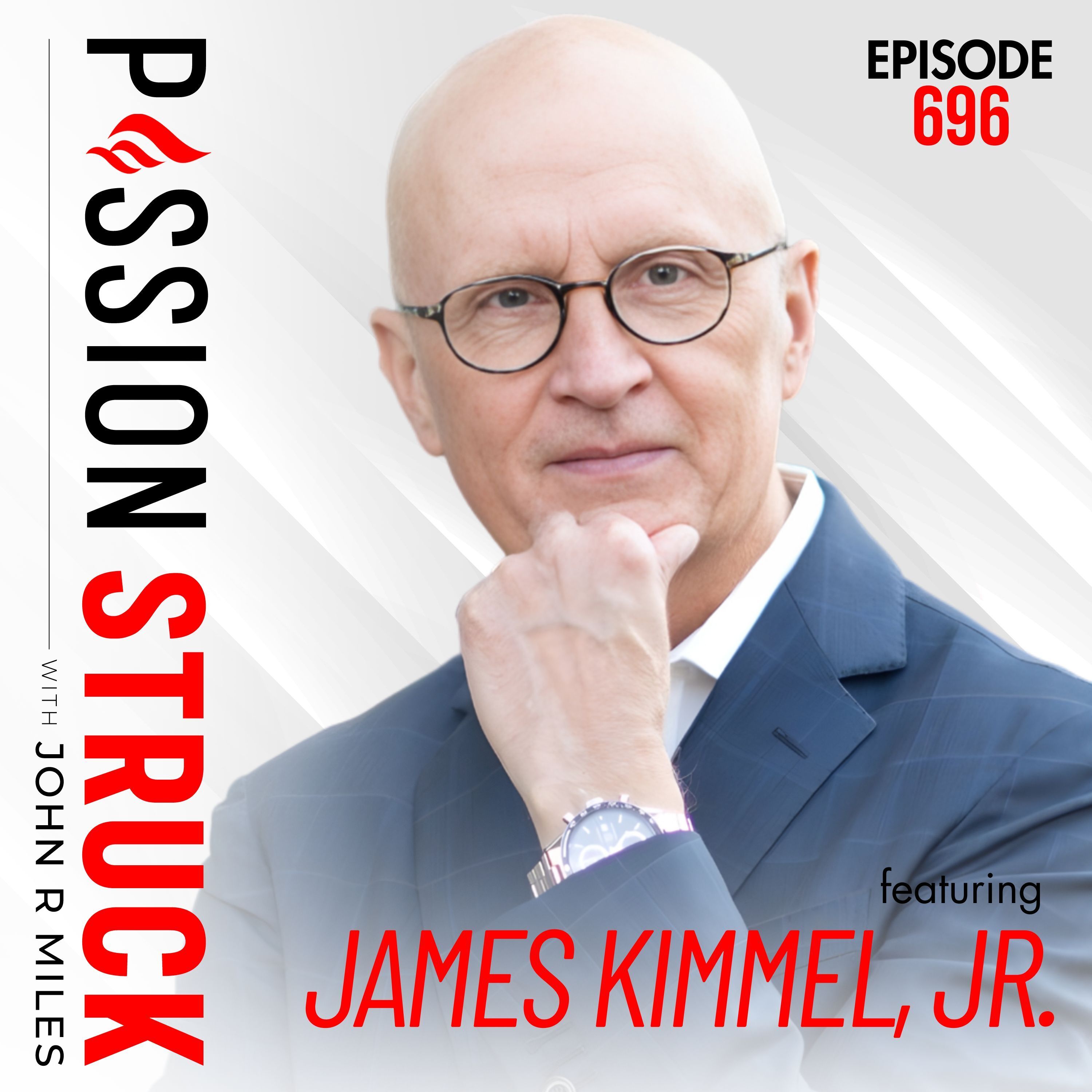Why Mental Health Is the Root of a Meaningful Life w/John R. Miles | EP 606
In this solo episode, John R. Miles explores how mental health isn’t just about managing stress—it’s the invisible infrastructure of everything that gives life meaning. From personal breakdowns to societal myths about strength, John shares why ignoring mental well-being doesn’t delay the cost—it multiplies it—and what we can do to reclaim emotional sustainability.
Join the new Passion Struck Community, The Ignition Room: https://station.page/passionstruck
This episode is part of Passion Struck’s Mental Health Awareness Month series, setting the tone for upcoming episodes on emotional resilience, internal reframing, and intentional habits for psychological well-being.
Key Takeaways:
- Mental health is not a side conversation—it’s the foundation of purpose, clarity, and connection.
- Emotional erosion happens slowly and quietly, not all at once.
- We’ve internalized the belief that needing help means failure—but in reality, it reflects emotional intelligence.
- Disconnection begins when we stop believing we matter.
- Productivity without presence leads to quiet burnout.
- You don’t need to hit a breaking point to start tending to your mind.
Sponsors:
- Factor Meals: http://factormeals.com/factormeals50off and use code “FACTOR MEALS 50 OFF”
- Rosetta Stone: Unlock 25 languages for life at “ROSETTASTONE.com/passionstruck.”
- Prolon: Reset your health with 15% off at “ProlonLife.com/passionstruck.”
- Mint Mobile: Cut your wireless bill to 15 bucks a month at “MINT MOBILE dot com slash PASSION.”
- Hims: Start your journey to regrowing hair with Hims. Visit hims.com/PASSIONSTRUCK for your free online visit.
- Quince: Discover luxury at affordable prices with Quince. Enjoy free shipping and 365-day returns at quince.com/PASSION
Next on Passion Struck:
In the next episode of Passion Struck, John sits down with Yongey Mingyur Rinpoche, a world-renowned meditation teacher and Buddhist monk. We'll explore how joy, awareness, mattering, and emotional turbulence can coexist, and how you can use the mind itself as a tool for healing, clarity, and purpose. It's a profound conversation on presence, transformation, and what it really means to be alive in this moment. You don't want to miss it.
For more information on advertisers and promo codes, visit Passion Struck Deals.
Speaking Engagements & Workshops
Are you looking to inspire your team, organization, or audience to take intentional action in their lives and careers? I’m available for keynote speaking, workshops, and leadership training on topics such as intentional living, resilience, leadership, and personal growth. Let’s work together to create transformational change. Learn more at johnrmiles.com/speaking.
Episode Starter Packs
With over 500 episodes, it can be overwhelming to know where to start. We’ve curated Episode Starter Packs based on key themes like leadership, mental health, and personal growth, making it easier for you to dive into the topics you care about. Check them out at passionstruck.com/starterpacks.
Catch More of Passion Struck:
- My solo episode on The Mattering Mindset in Love – Choose the Love You Deserve
- Can't miss my episode with Jennifer B. Wallace on the Consequences of Prioritizing Achievements Over Mattering
- My episode with The Art of Listening: How to Make People Feel Like They Matter
- Catch my interview with Laurie Santos on How to Matter in a Busy World
- Listen to my solo episode on Fading into Insignificance: The Impact of Un-Mattering in Our Interconnected Era
If you liked the show, please leave us a review—it only takes a moment and helps us reach more people! Don’t forget to include your Twitter or Instagram handle so we can thank you personally.
How to Connect with John:
- Connect with John on Twitter at @John_RMiles
- Follow him on Instagram at @John_R_Miles
- Subscribe to our main YouTube Channel and to our YouTube Clips Channel
- For more insights and resources, visit John’s website
Want to explore where you stand on the path to becoming Passion Struck? Take our 20-question quiz on Passionstruck.com and find out today!
See Privacy Policy at https://art19.com/privacy and California Privacy Notice at https://art19.com/privacy#do-not-sell-my-info.
Press play and read along
Transcript
Speaker 1 Why choose a sleep number smart bed?
Speaker 3 Can I make my site softer?
Speaker 1 Can I make my site firmer?
Speaker 2 Can we sleep cooler?
Speaker 1
Sleep number does that, cools up to eight times faster, and lets you choose your ideal comfort on either side. Your sleep number setting.
Enjoy personalized comfort for better sleep night after night.
Speaker 1 It's our Black Friday sale, recharged this season with a bundle of cozy, soothing comfort. Now only $17.99 for our C2 mattress and base, plus free premium delivery.
Speaker 1 Price is higher in Alaska and Hawaii. Check it out at a sleep number store or sleepnumber.com today.
Speaker 4 Hi, I'm William Googe, a Vuri collaborate and professional ultra runner from the UK. I love to tackle endurance runs around the world, including a 55-day 3064-mile run across the US.
Speaker 4 So I know a thing or two about performance wear.
Speaker 5 My go-to daily short is the core short from View.
Speaker 4 It's perfect for my daily run in the gym, strength training, or even when I'm taking a day off, relaxing, doing some stretching, and recovering the best way I can.
Speaker 5 Check them out by visiting viewer.com/slash slash William. That's V-U-O-R-I dot com slash William, where new customers can receive 20% off their first order, plus enjoy free shipping in the U.S.
Speaker 4 on orders over $75 and free returns. Excluding supply, visit the website for full terms and conditions.
Speaker 6 Coming up next on Passion Struck, what if the most important part of your life wasn't visible? Not your goals, not your productivity, but the quiet system underneath it all.
Speaker 6 In episode 606, I'm diving into the part we rarely talk about, your mental health, not in crisis terms, not in clinical language, as the baseline for connection, creativity, purpose, and resilience.
Speaker 6
If you've ever felt like you're performing on the outside, but quietly unraveling underneath, this one's for you. Welcome to Passion Struck.
Hi, I'm your host, John R.
Speaker 6 Miles, and on the show, we decipher the secrets, tips, and guidance of the world's most inspiring people and turn their wisdom into practical advice for you and those around you.
Speaker 6 Our mission is to help you unlock the power of intentionality so that you can become the best version of yourself. If you're new to the show, I offer advice and answer listener questions on Fridays.
Speaker 6 We have long-form interviews the rest of the week with guests ranging from astronauts to authors, CEOs, creators, innovators, scientists, military leaders, visionaries, and athletes.
Speaker 6
Now, let's go out there and become Passion Struck. Hey everyone, John here, and welcome to episode 606 of Passion Struck.
Before we dive in, I just want to say thank you.
Speaker 6 This past week has been filled with meaningful moments for the show in this community.
Speaker 6 Passion Struck was just ranked number three on Million Podcast List of Best Life Leadership Podcasts, alongside the Jocko Podcast and School of Greatness.
Speaker 6 And we were honored with the Gold Stevie Award for Best Independent Podcast at the 2025 American Business Awards. Those are incredible honors, but they matter most because of you.
Speaker 6 Because of this community, this movement, people who don't just listen, but act, reflect. And now we step into a new chapter.
Speaker 6 May is Mental Health Awareness Month, and here at Passionstruck, we're dedicating the month's episodes to the conversations that often go unsaid. We kicked off the week with two powerful interviews.
Speaker 6 On Tuesday, I sat down with Gretchen Rubman for live taping in front of 200 plus people, diving into the secrets of adulthood and the small truths and big realizations that shape a meaningful life.
Speaker 6 Then on Thursday, I was joined by Elizabeth Weingarten, whose new book, Fall in Love with the Questions, explores how the right questions don't just shift our thinking, they unlock deeper connection and self-discovery.
Speaker 6 And today I'm bringing you something different, something personal. a solo episode about something foundational, your mental health.
Speaker 6 Not in terms of a crisis or clinical diagnosis, but is the quiet root system that everything else in your life grows from.
Speaker 6 This episode is about the erosion we don't always see, the slow drift that happens when we're still performing, still producing, still showing up, but slowly disconnecting from ourselves.
Speaker 6 We'll talk about why mental health is the baseline for everything that matters, why it's so often ignored until it's too late, and what it looks like to build an emotionally sustainable life before burnout, before breakdown.
Speaker 6 And if this kind of conversation resonates with you, I want to personally invite you into the Ignition Room, our private community for people who want to go deeper, live with intention, and connect around those ideas in real time.
Speaker 6 Links are in the show notes, and it's built for people like you, people serious about building a life that actually feels like their own.
Speaker 6 Because if we're going to build a life that matters, we can't ignore the thing that sustains all of it. So let's get into it.
Speaker 6 Thank you for choosing Passion Struck and choosing me to be your host and guide on your journey to creating an intentional life. Now, let that journey begin.
Speaker 6 If you've followed me for any length of time, you know I'm constantly searching for the breakthroughs that actually make a difference in how we age, feel, and perform.
Speaker 6 Lately, I've been taking timeline Metopure gummies, and I got to tell you, I'm feeling the shift. My energy is more sustained, my focus sharper, and my recovery quicker.
Speaker 6 It's like I upgraded my engine at the cellular level. What makes them stand out?
Speaker 6 They're powered by MitoPure, the only clinically proven form of urolithin-A, a compound that activates your longevity pathways, supports muscle strength, and improves cellular energy.
Speaker 6 It's clean, vegan, and backed by over 15 years of cutting-edge science. Dr.
Speaker 6 Mark Hyman calls urolithin A a game changer for longevity, and with Mitopure, everyone can benefit, no matter your gut health.
Speaker 6 If you want to stay strong and energize now and as you age, then you have to try Motto Pure Gummies. My friends at Timeline are offering 20% off just for my listeners.
Speaker 6
Head to timeline.com slash passionstruck to get started. That's timeline.com slash passionstruck.
Yourselves will thank you.
Speaker 3 November is all about gathering. Friends giving feasts, Thanksgiving dinners, and football weekends.
Speaker 3 Total one and more has everything you need for your table and your toast with thousands of wines, spirits, and beers at the lowest prices.
Speaker 3 From bold reds to sparklers, you'll find the perfect wines to raise a glass this season.
Speaker 3 And when it comes to spirits, Total Wine has you covered from smooth bourbons and tequilas to all the essentials for your holiday cocktails.
Speaker 3 Hosting Thanksgiving, Total Wine's guides make it easy by taking out the guesswork.
Speaker 3 With the lowest prices for over 30 years, you'll always find what you love and love what you find only at Total Wine and More. Curbside pickup and delivery available in most areas.
Speaker 3
See TotalWine.com for details. Spirits not sold in Virginia and North Carolina.
Drink responsibly. B21.
Speaker 6 Over a decade ago, I was in the middle of a 34-week discipleship class at my church. We met twice a week and we studied scripture.
Speaker 6
We wrestled with what it meant to live a life of faith, not just in belief, but in behavior. And somewhere around week 12, I started to feel it.
This tug, this whisper.
Speaker 6 I felt like I was being called to help a certain group of people. Not the successful, not the already thriving, but the ones who felt lonely, beaten down, bored, broken, hopeless.
Speaker 6
I didn't know what to do with that. I was a business executive, running teams, building strategy.
What did I know about those people? I kept showing up to class twice a week. I kept reading.
Speaker 6
I kept praying. And the calling didn't go away.
But the clarity didn't come either. For years, I carried that feeling in the back of my mind quietly.
Speaker 6
I didn't understand why I felt drawn to help those who felt unseen. I just knew that the pull wouldn't leave.
And during that same season, something else started to shift. At first, it was small.
Speaker 6
Life just felt... duller.
Things that used to light me up didn't. The colors around me felt muted.
Joy got quieter, and so did I.
Speaker 6 But I was still showing up, still performing, still hitting deadlines, still doing the work, so I ignored it until I couldn't anymore.
Speaker 6 Because eventually, I hit the wall, mentally, emotionally, physically. I didn't crash all at once, but the weight finally caught up to me.
Speaker 6 And in the middle of that unraveling, the old question came back, that calling I'd carried for years. And for the first time, I saw it differently.
Speaker 6 I thought I'd been called to help them, but I realized I was one of them, lonely, drifting, disconnected, not broken, but breaking. That's when I began to understand something I'd missed for years.
Speaker 6
These people, the ones I felt drawn to help, They weren't all the same, but they shared something underneath the surface. They didn't just feel stressed.
They felt invisible.
Speaker 6 They felt like they didn't count, like their presence made no difference. And when you don't feel like you matter, that's when everything else starts to fall apart quietly.
Speaker 6
That was the moment it all clicked. Mental health isn't just about what's happening in your mind.
It's about what's happening in your soul when you start to believe you don't matter.
Speaker 6 So that's what today's episode is about.
Speaker 6 Because if we want to build meaningful lives, if we want to lead, love, connect, and create with death, we have to start by tending to the quiet root beneath it all.
Speaker 6 Not strategy, not hustle, mental health, and not just in crisis, not when everything breaks, but every day is the foundation that holds everything else up. Let's begin.
Speaker 6
Let's start with the truth most of us feel, but rarely name. Mental health isn't just emotional, it's existential.
It's not just about stress or burnout or even anxiety.
Speaker 6 It's about whether we believe we matter. It's about whether we feel seen, valued, connected, not just in what we do, but in who we are when we're not on.
Speaker 6
And when that sense of mattering slips, so does our stability. You know the moments.
when you're crushing it at work, but no one notices.
Speaker 6 When you're there for everyone else, but nobody asks how you're holding up.
Speaker 6 When something changes inside you and it feels like no one's paying attention, that's not just pressure, that's psychological invisibility, and it wears on us, not all at once, but gradually.
Speaker 6 Because mental health doesn't always collapse in a breakdown. Sometimes it just quietly unthreads as the belief that we matter starts to fray.
Speaker 6
And that leads to four fundamental truths that are at the heart of this episode. So let's go into truth one.
Mental health is the unseen infrastructure of everything that matters.
Speaker 6 Most of the things we say we want, purpose, connection, confidence, peace, resilience, aren't built on skills alone. They're built on internal stability.
Speaker 6
And that stability doesn't come from what we achieve. It comes from how we're doing on the inside, even when no one's watching.
This is the part we skip over.
Speaker 6
We track our sleep, our steps, our macros. We optimize our calendars.
We chase peak performance.
Speaker 6
But if we're not tending to what's underneath our emotional architecture, it all starts to feel strangely hollow. I lived this too.
I had seasons where I was at the top of my game professionally.
Speaker 6
I was recognized, productive, outwardly thriving. But inside, I felt brittle.
My days were full. and I felt empty.
And I remember thinking, if I'm doing everything right, why do I feel so off?
Speaker 6
Because you can be high functioning and still be emotionally unstable. You can execute at a high level while quietly eroding beneath the surface.
Mental health isn't some bonus benefit.
Speaker 6
It's the foundation. It's the baseline energy you need to engage with your life, not just react to it.
It's the clarity that lets you respond with intention. instead of reactivity.
Speaker 6 It's the fuel behind creativity, focus, connection, and leadership. And when it starts to wobble, everything on top of it gets shaky.
Speaker 6 You feel it in your sleep, in your short fuse, in the way joy becomes muted, in the way your patience thins, or your confidence stalls, or the light behind your eyes just dims.
Speaker 6
When we talk about how mental health shapes everything that matters, this is what we mean. Because everything that matters lives in the emotional layer.
Leadership isn't just strategy.
Speaker 6
It's emotional regulation under pressure. Relationships aren't just time spent.
They're felt connection. Purpose isn't just goals.
It's internal resonance.
Speaker 6
Without a solid foundation, those things don't disappear. They just get heavier, blurrier, harder to hold.
This isn't weakness. It's wiring.
Speaker 6 You're not broken for needing inner support to function well on the outside. You're just human.
Speaker 6 And the sooner we stop treating mental health like like an add-on, the sooner we start building lives that can actually carry the weight of what we care about.
Speaker 6
Because what's underneath is what's holding everything up. And this leads us to truth number two.
We've pathologized mental health as weakness instead of capacity.
Speaker 6 Somewhere along the way, we've learned to talk about mental health only in terms of crisis.
Speaker 6
We wait until things fall apart, until the breakdown comes, until the word burnout finally shows up in our vocabulary. And then, and only then, do we name it.
But mental health isn't just a red flag.
Speaker 6
It's a vital sign. Just like physical strength helps you carry weight, mental health is what allows you to show up under pressure without crumbling.
It's not about whether you're struggling.
Speaker 6 It's about whether you have the capacity to respond to what life is asking of you. And that capacity shifts.
Speaker 6 It contracts when we're grieving, when we're overextended, when we're isolated, emotionally drained, or moving through life like we're a pinball. But instead of naming that, we bury it.
Speaker 6
I remember seasons when I was running full tilt, juggling deadlines, managing teams, taking on more than what was sustainable. And I told myself, John, you're fine.
You can handle this.
Speaker 6
So many other people are doing more. I didn't want anyone to know how close I was to the edge.
I bought into the idea that if I admitted I was overwhelmed, I'd seem unstable, or worse, incapable.
Speaker 6
So I kept pushing, but I wasn't being strong. I was just suppressing reality and burning through capacity I didn't know I'd need later.
This is what happens when we mistake depletion for discipline.
Speaker 6
We smile through disconnection. We lead through exhaustion.
We perform over a cracked foundation and call it resilience. But this isn't about toughness.
It's about resourcing.
Speaker 6 Are you connected to yourself? Are you emotionally supported? Do you still believe your presence makes a difference?
Speaker 6
Because when you do, your capacity expands, not because life gets easier, but because you're no longer carrying it alone. You've stopped pretending it's not heavy.
The real danger isn't being tired.
Speaker 6
The real danger is believing that needing help makes you broken. It doesn't.
What it means is you're wired normally. You're not supposed to be unshakable.
You're supposed to be supported.
Speaker 6 And the moment we stop treating mental health like a personal flaw and start treating it like a shared condition, we start to rebuild something far more powerful than productivity. We build capacity.
Speaker 6
Because mental health isn't fragility. It's your operating system.
And you don't wait until the system crashes.
Speaker 6 you take care of it while it's still running so it can keep running and this right here is why we're dedicating May to these conversations. Because mental health isn't a trend.
Speaker 6 It's not a week on the calendar. It's the groundwork for everything else that matters.
Speaker 6 So all month long, we're opening the door to deeper questions through solo episodes like this and in conversations with some of the most insightful minds on purpose, presence, and emotional well-being.
Speaker 6 If you've ever felt like you had to hold it all together alone, or if you've quietly wondered why doing all the right things still doesn't feel quite right, I hope you'll continue to show up here because we're not just talking about mental health, we're reframing it as the first step towards building a life that actually feels like yours.
Speaker 6 We'll be right back after a quick break from our sponsors and when we return, we'll talk about the hidden cost of pushing things down, how ignoring your mental health doesn't delay the fallout, it multiplies it.
Speaker 6 And we'll close by exploring why your mental health isn't just important, it's foundational if you want to build a life of real meaning and connection.
Speaker 7 This episode is brought to you by Progressive Commercial Insurance. As a business owner, you take a lot of roles: marketer, bookkeeper, CEO.
Speaker 7 But when it comes to small business insurance, Progressive has you cover.
Speaker 7 They offer discounts on commercial auto insurance, customizable coverages that can grow with your business, and reliable protection for whatever comes your way.
Speaker 7
Count on Progressive to handle your insurance while you do, well, everything else. Quote today in as little as eight minutes at ProgressiveCommercial.com.
Progressive Casualty Insurance Company.
Speaker 7 Coverage provided and serviced by affiliated and third-party insurers. Discounts and and coverage selections not available in all states or situations.
Speaker 1 At Anytime Fitness, we believe no challenge is too big to bench press, that you can split-squat your way to happiness, and that strength training isn't just for big muscles, it's for a bigger, better life.
Speaker 1 Anytime Fitness has everything you need in one heavy lifting membership, anytime access to over 5,300 locations, all the equipment you need to get stronger, and expert coaches who can optimize a plan just for you.
Speaker 1 So grab life by the barbell. Join now at anytimefitness.com.
Speaker 6 Welcome back. So far, we've talked about how mental health is the unseen infrastructure of everything that matters and why it's not just about weakness, but about capacity.
Speaker 6 But what happens when we ignore it? What happens when we just keep pushing, suppressing, pretending we're fine because asking for help feels like failure? That's where we're going next.
Speaker 6 Because the truth is, ignoring your mental health doesn't delay the cost it compounds it and that's truth number three we like to think we can outpace it that if we just keep going just hit the deadline survive the season push through the noise we'll handle our mental health later but emotional erosion doesn't wait it just buries itself deeper and compounds and i know this from experience i was taught early on that needing help was a kind of failure, that therapy or counseling or even just talking to someone was a sign that you were unstable or worse, unfit.
Speaker 6
When I was in the military, this belief got reinforced. We were warned that seeing a mental health provider could put your security clearance at risk.
The message was clear, even if unspoken.
Speaker 6
Don't show weakness. Don't say it out loud.
Handle it quietly. And so I did.
Even as I climbed in my career, and my responsibilities grew, I kept pushing everything down.
Speaker 6
The stress, the internal noise, the exhaustion. I just added more on top, more deadlines, more commitments, more achievement.
And from the outside, everything looked fine.
Speaker 6
But internally, it was like piling weight on a structure that had already started to crack. Eventually, the pile gets too high.
It doesn't collapse all at once. It buckles slowly.
Speaker 6
You start forgetting things. You snap quicker.
You lose joy in the moments that used to light you up. You don't realize you're drowning until you finally stop kicking.
And here's what I learned since.
Speaker 6
Mental health doesn't explode, it erodes. And the longer you avoid it, the harder it becomes to find your way back.
If you're hearing this and something inside is nodding quietly, listen to that.
Speaker 6 Not because you're falling apart, but because you shouldn't have to get to the edge to justify taking care of your mind. You don't get away with ignoring your inner life.
Speaker 6
You just delay the impact and multiply the cost. And this leads us to truth number four.
If you want a meaningful life, mental health isn't optional. It's step one.
Speaker 6 We spend so much time trying to build meaningful lives through success, service, legacy, and growth. But here's the truth most of us overlook.
Speaker 6
If your inner life is unstable, your outer life can't hold you. And this reminds me of the book by Gretchen Rubin, who I interviewed earlier this week.
She talks about outer order creates inner calm.
Speaker 6
And mental health ties into that because it isn't a side goal. It's the foundation everything else stands on.
And I don't just mean that in a quote unquote self-care way.
Speaker 6
I mean that in the most practical, long-term, purpose-driven way possible. When your mental health is steady, you have space to reflect.
You're more present with the people you care about.
Speaker 6
You don't just react. You respond.
You don't just endure. You build.
And when it's fragile, everything feels heavier than than it should. Even good things don't land the way that they used to.
Speaker 6 You start surviving your life instead of living it. I know what it feels like to try and build from that place, to keep stacking goals, projects, wins on top of a foundation that's quietly caving in.
Speaker 6 It doesn't work because a meaningful life isn't just built from the outside in. It's built from the inside out.
Speaker 6
And that means mental health can't be something we circle back to once once things get calmer. It has to be step one.
Why? Because meaning isn't just about what we do.
Speaker 6 It's about whether we believe we matter while we're doing it. And that brings us back to something I talked about in episode 600 on serendipity.
Speaker 6 In that episode, I talked about the idea that serendipity isn't just magic. It's a mirror, a reflection of how present we are, how willing we are to notice the small, meaningful cues life offers us.
Speaker 6 But here's what I didn't say out loud then, and what I want to say now. That presence, that noticing, that ability to feel connected to those moments.
Speaker 6
It only happens when your internal world isn't underwater. Which brings me to what I call the mattering mental health loop.
And here's how it works.
Speaker 6
When we believe we matter, we stay emotionally engaged. When we're engaged, we notice more about ourselves and about others.
And that noticing helps us respond with care.
Speaker 6
And care reinforces connection. And connection reminds us that we matter.
That's the loop. But the reverse is also true.
When we start to question our worth, we disengage. We stop noticing.
Speaker 6
We stop connecting. And the world feels flatter, colder, more fragmented.
Not because life got worse, but because we started feeling like we didn't count anymore.
Speaker 6 So let's come back to where this all began.
Speaker 6 That 34-week discipleship course, that quiet sense of calling I couldn't quite make sense of, that feeling that I was meant to help the lonely, the bored, the broken, the invisible.
Speaker 6 What I didn't realize then, but I know now, is that the person I was being called to help was also me, and that I was being asked to understand something deeper, that mental health isn't just about healing.
Speaker 6
It's about anchoring. It's the thread that runs through everything that matters.
Because mental health doesn't always break loudly.
Speaker 6 Sometimes it drifts until one day you realize you don't quite feel like yourself anymore.
Speaker 6 And if we want to live lives of meaning, not just motion, we have to treat mental health as the starting point, not the side note.
Speaker 6 That's why all month long, we're diving deep into what truly sustains us.
Speaker 6 Coming up in this special Mental Health Month series, I'll be covering the mental health habits that anchor you in uncertain times, how to reframe your inner world for growth and resilience, and how to build a mental health ecosystem that honors who you are.
Speaker 6 So stay tuned for my solo episodes in the coming weeks.
Speaker 6 And if today's conversation sparks something in you, I hope you'll join us inside the Ignition Room, our private community where we go beyond the episodes and into real meaningful dialogue.
Speaker 6 If today's episode resonated, please take a moment to leave a five-star rating or share it with someone else you care about.
Speaker 6 It's the easiest way to help us spread this movement to those who need it most.
Speaker 6 And if you're looking to bring these ideas into your organization, leadership team, or event, you can find more about my keynotes and workshops at johnrmiles.com/slash speaking.
Speaker 6 I'd love to support your mission. And make sure you're subscribed because next Tuesday, I'm sitting down with the extraordinary Dr.
Speaker 6 Andrew Newberg, a pioneering neuroscientist in the field of neurotheology. And we'll explore the intersection of belief, mattering, the brain, and what science reveals about spiritual experience.
Speaker 6 It's a powerful episode you don't want to miss.
Speaker 8 If you are part of a religious group that is engaged in a ritual, it could be a ceremony, it could be a meditation practice, a prayer program, then you have a whole bunch of people whose parietal lobes are now quieting down.
Speaker 8 And as they engage this practice, that boundary between themselves and the other people that are with them begins to go away.
Speaker 8 They begin to feel blended, connected, again, unified, different words that people use, but a sense of oneness with the individuals, with the other individuals that are part of this process.
Speaker 6 Until then, remember: if you're intentional about building the life you want, you must be just as intentional about protecting it.
Speaker 6 Live boldly, lead with intention, and above all, live life passion-struck.
Speaker 1 At Pluralsight, Pluralsight, we don't just teach skills, we are building the tech workforce who deliver results fast, accelerated by top-tier content. Lead with confidence, lead with expertise.
Speaker 1 Visit us at Pluralsight.com to tap in and learn more.
